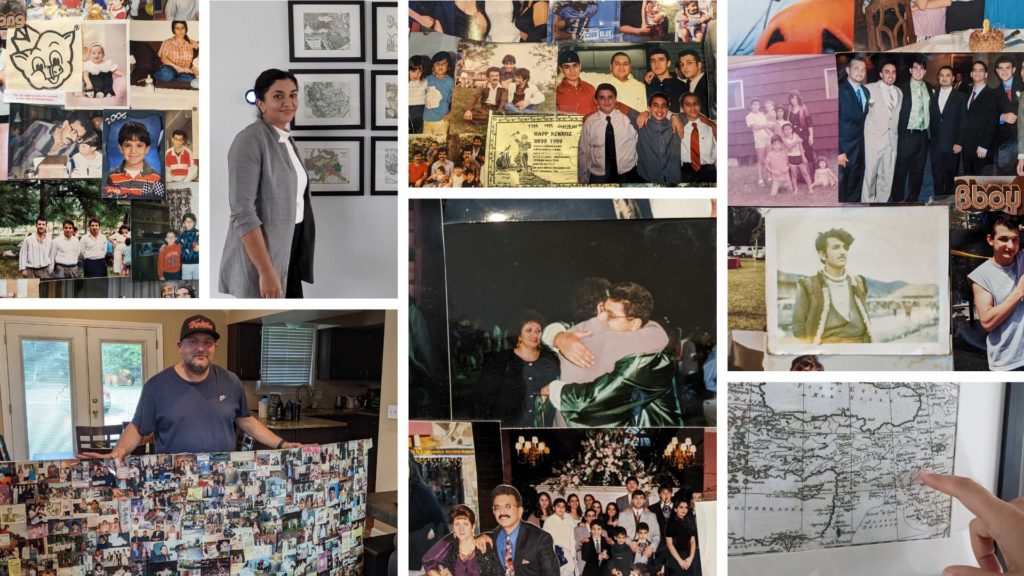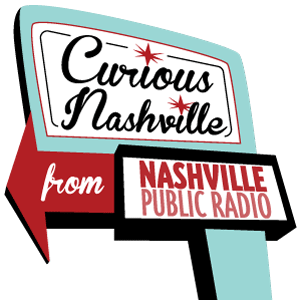
You may be aware that Nashville is home to the biggest population of Kurdish people in the United States — Kurds, who are considered the largest ethnic group in the world without a sovereign state. But one Curious Nashville listener asked how Nashville came to be such a destination for Kurds. The answer is multi-layered.
Western powers promised the Kurds a state of their own after World War I, but when they finalized the boundaries, there was no Kurdistan. Instead, Kurds are split across the borders of Turkey, Syria, Iraq and Iran.
 Alexis Marshall WPLN News
Alexis Marshall WPLN NewsDilman Yasin points to a map of Kurdistan hanging in her family’s living room.
Multiple waves of migration
The first wave of Kurds settled in Nashville in the mid-to-late 1970s after a thwarted independence movement.
Among those revolutionaries was the father of Halmat Qazi. Their family was initially resettled in Chicago. But they had friends in Nashville.
“When my father came down to visit, he just knew. He was like, ‘Nashville’s where it’s at. This is where we need to be. There are more Kurds here. It’s a small town.’ You know, I think late ’70s people were really nice,” Qazi says.
So, they moved. That ended up being a defining feature of Nashville’s Kurdish community. Many Kurds were initially sent somewhere else, heard about the community here and chose to uproot their lives yet again to be part of it.
There are several reasons for that. Nashville was easier to navigate than a major metropolis like Chicago. And many manufacturers were moving to the South to avoid union demands in the North and Midwest, so jobs were more accessible. Some Kurds even say the climate and hilly landscape of Tennessee reminds them of Iraqi Kurdistan.
Qazi keeps a large collage with pictures from his upbringing and Nashville’s Kurdish community. The photos depict decades’ worth of life events and community gatherings.
Second wave
Many in the second wave of Kurdish refugees were civilians fleeing for their lives. Among them was Dilman Yasin, whose family left Iraqi Kurdistan in 1988.
“Saddam Hussein went on just a rampage, a mass genocide of Kurds where he bombed, killed, gassed thousands upon thousands of Kurds — literally raiding villages from one village to the next and just trying to get rid of Kurds,” Yasin says.
According to Human Rights Watch, Hussein’s regime killed as many as 100,000 Kurds around this time.
When she was just a one-year-old, Yasin, her mother and newborn brother traveled through the mountains to Turkey, where they lived in a refugee camp for four years.
They were eventually resettled in Boise, Idaho, but heard of a large Kurdish community in Nashville. So in the mid-’90s, they too made this second migration to connect with the Kurdish culture here in Nashville. “And so we came and we never looked back,” says Yasin.
Third Wave
The third wave of Kurds came around 1996 and ’97. At that time, Iraqi forces were targeting people with ties to Western aid groups and the U.S. military. Many of them fled to Turkey and were quickly airlifted to a U.S. military base in Guam. Nawzad Hawrami was one of them.
“We stay in Guam about four months, and after that, we (chose) to come to Nashville due to the existing community there … and also again, we had nice city, (nice) weather, job opportunity and welcome city.”
Hawrami helped found one of the cornerstones of the Kurdish community in Nashville — the Salahadeen Center. Founded in 1998, it was the first Kurdish mosque in the United States, according to multiple sources. The building is in the heart of Little Kurdistan in South Nashville. Not all Kurds are Muslim, but many are. And the center has served as an important site for building community, civic engagement and youth camps.
Sixteen-year-old Rabia Ayaz, who’s half-Kurdish, volunteered at a youth camp at the Salahadeen Center this summer. She moved to Nashville earlier this year and says it’s been a good change for her.
“I haven’t really explored that much of my Kurdish side because I grew up in Virginia with the Turkish community. But moving here, it’s teaching me a lot more about my culture,” Ayaz says. “I can enjoy myself while also enjoying my American identity.”
Nashville is giving her the space and community to more freely navigate her heritage.
Now, more than 40 years after the first Kurds settled in Nashville, parents and leaders have big ambitions for this next generation. Listen to the full episode of This Is Nashville to hear more about their aspirations for the future of this community.


